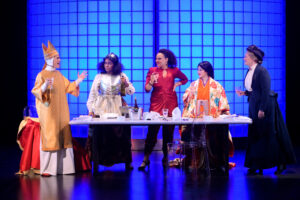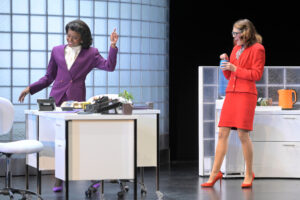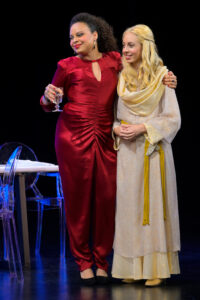
Caryl Churchill’s “Top Girls” hasn’t been performed in the Bay Area in a long time. It’s been revived as the season opener at American Conservatory Theater, directed by Tamilla Woodard and running through October 13.
About a hard-charging female executive angling to move up the management ladder, the 37-year- old play has lost none of its relevance in the intervening decades, as is made dismayingly clear in several essays-with-statistics in “Words on Plays,” the fascinating booklet that accompanies the show’s playbill. Women still lag behind men in compensation and positions of authority. There’s nothing revelatory in that, but the piece has nonetheless acquired a bit of tarnish over the years.
Director Woodard pulls wonderfully committed performances from her eight-member cast…
At its core, “Top Girls” is a simple tale of a British career woman named Marlene (Michelle Beck), running from the limited opportunities of her working-class origins and pouring all her considerable energy into the pursuit of corporate power. Set in the early 1980s—the play debuted in ’82—it depicts Marlene maneuvering for an executive position even if it means displacing a male colleague who’s the sole support for his family of four. A Thatcherite, Marlene believes in meritocracy – the idea that the cream of society rises to the top – and dismisses the entitlement mentality of leftists and union workers.

As a manager in a busy employment agency, Marlene doesn’t gladly suffer fools. Her interviews with job-seekers are brusque, bordering on insulting, and she doesn’t hesitate to dominate her office-mates. They are not friends. But suffer she does, as we learn in the second act—from the slights she has showered on her family and the personal sacrifices she’s made seeking power in a man’s world. She doesn’t really have a life outside work.
The opening scene could be interpreted as evidence of Marlene’s suffering, and by extension, the suffering of all ambitious women. It’s a comically nightmarish dinner party featuring notable women fictional and historical: 19th-century adventurer Isabella Bird (Julia McNeal); Lady Nijo (Monica Lin), an 11th-century exile from the Japanese Imperial Court; the legendary Pope Joan (Rosie Hallett), thought to have reigned during the Middle Ages in the guise of a man; and Dull Gret (Summer Brown), a fearsome warrior immortalized by Brueghel. All bucked the patriarchy; the scene offers each an opportunity to tell her story. Each recitation adds fuel to Marlene’s furious purpose. It also allows all of them to riff simultaneously in multiple accents, an effect that’s literally a fugue of howling madwomen.
We get that they’re angry, even centuries after the fact, but from the audience’s point of view the scene is too long, consuming most of the first act. Here and there in the cacophony we understand a phrase or two, but for the most part, it’s as comprehensible as a long night of Dada poetry.
An esteemed British playwright, Churchill is no respecter of traditional temporal narrative or dramatic structure. The dinner scene—an exercise in art for art’s sake—is followed by an introduction to the employment service where Marlene works, and that, by a scene of two girls at play in a backyard—Kit (Lily D. Harris) and Angie (Gabriella Momah). The first act closes leaving viewers wondering how all this ties together.

The second act is both rebuttal to and redemption for the excesses of the first. In a scene of gut-wrenching earnestness, Marlene has a heart-to-heart with her sister Joyce (Nafeesa Monroe) in her kitchen, where we learn the roots of Marlene’s driving ambition and the nature of her relationship to her worshipful, enthusiastic, but dim-witted niece Angie. The final scene takes place a year before the preceding one, but makes solid dramatic sense.
The play’s difficulties and pretensions are offset by superb acting by a cast of eight women, all save Beck and Momah in dual roles. Performances range from good to exemplary, including Hallett as Win and Brown as Nell, two different but dynamically balanced office workers whose arch banter spices their otherwise tedious workdays. Harris is youngest-appearing of the cast—she looks to be in her late teens—and mid-way through the second act she does a fantastically funny turn as a job-seeker named Shona pretending to be much older.
Shona bluffs with enormous chutzpah and an increasingly absurd litany of business buzzwords during her interview with Nell. She doesn’t know much and the more she talks the more it shows, an expertly rendered comedic sketch that provoked spontaneous applause on opening night.
Aided by Barbara Samuels’s elegant lighting, set designer Nina Ball achieves something remarkable with “Top Girls”—an austere set evoking the coldness of the business world, and another one quite warm and cozy as Joyce’s home. The emergence of Joyce’s residence from far back to stage front is a marvelous effect.
Director Woodard pulls wonderfully committed performances from her eight-member cast, but the standout for this reviewer is Gabriella Momah as the lovable, sweet-natured but intellectually limited Shona. She’s an absolute delight, a bright ray of sunshine in this darkly-tinted story.
 ASR Executive Editor Barry Willis is a member of the American Theatre Critics Association and president of the San Francisco Bay Area Theatre Critics Circle.
ASR Executive Editor Barry Willis is a member of the American Theatre Critics Association and president of the San Francisco Bay Area Theatre Critics Circle.
| Production | Top Girls |
|---|---|
| Written by | Caryl Churchil |
| Directed by | Tamilla Woodard |
| Producing Company | American Conservatory Theater (ACT) |
| Production Dates | Through Oct 13th |
| Production Address | American Conservatory Theater 415 Geary Street San Francisco, CA 94102 |
| Website | www.act-sf.org |
| Telephone | (415) 834-3200 |
| Tickets | $25 – $102 |
| Reviewer Score | Max in each category is 5/5 |
| Overall | 4/5 |
| Performance | 4/5 |
| Script | 4/5 |
| Stagecraft | 4/5 |
| Aisle Seat Review PICK? | YES! |
